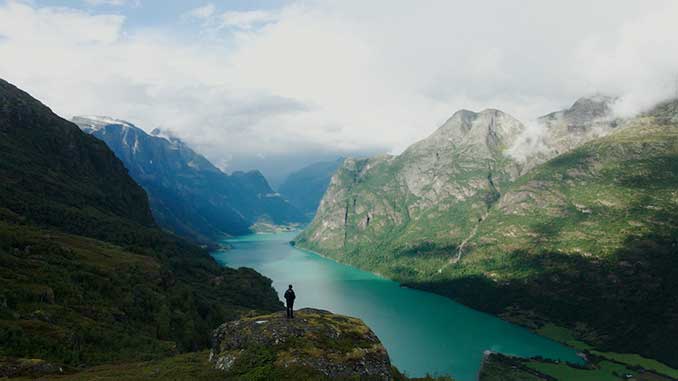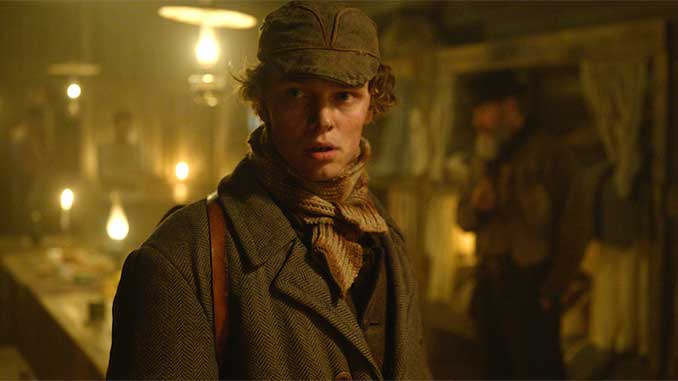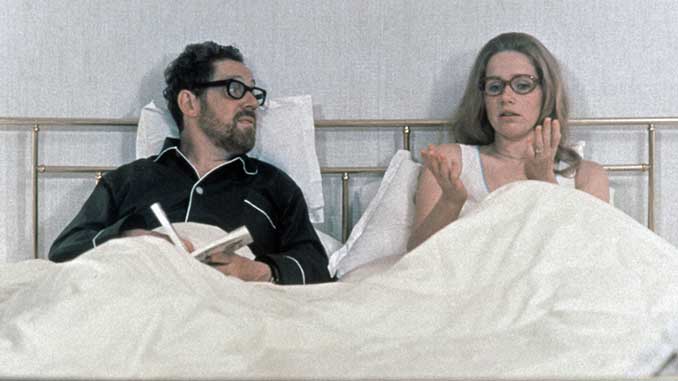 Zak Hepburn, thank you very much for joining me in conversation – your career is impressive! As a Curator of Film and Screen Culture at Palace Cinemas you are likewise involved in national programming managing and feature extensively in the Australian media as a resident film critic for ABC News Breakfast, presenter and film critic. You also act as Creative Director at the iconic Astor Theatre in Windsor – a “classic, single-screen cinema famous for its presentation of classics, cult favourites and select new releases.”[1]
Zak Hepburn, thank you very much for joining me in conversation – your career is impressive! As a Curator of Film and Screen Culture at Palace Cinemas you are likewise involved in national programming managing and feature extensively in the Australian media as a resident film critic for ABC News Breakfast, presenter and film critic. You also act as Creative Director at the iconic Astor Theatre in Windsor – a “classic, single-screen cinema famous for its presentation of classics, cult favourites and select new releases.”[1]
You are much aware of what films appeal to festival audiences at any given time. In regards to the Scandinavian Film Festival, what criteria determine what films will make the cut and do they tend to differ considerably from those shown the previous year?
It is a collective effort between the festival team. And, importantly, it is a conversation between us as programmers and between audience members. It is a communal way of engaging with screen art. We are selecting titles that will engage audiences and allow them to have escapism and to reflect.
What are some festival highlights this year and who do you see as some of the most outstanding directors? Are there any promising new Scandinavian directors included whose voice you feel will make a difference?
I think one of the great centrepieces of the festival is Touch (2024) by award–winning Icelandic filmmaker Baltasar Kormákur. It is a beautiful, tender film which follows a man’s emotional journey to find his first love. It is showcased over two different time periods.
You see a period drama unfolding with a contemporary character piece which is also centred around the Covid pandemic, so it is quite timely in that regard. It reminded me very much of Past Lives (2024). It is about those characteristics of a film. You see two different characters conversing and having an experience that changes their lives.
The closing night film is Songs of Earth (2023) which is a nature documentary / intellectual piece set in the Norwegian wilderness about how we as a species interact with nature. It is a cinematic experience (under the trekking guidance of filmmaker Margreth Ohlin’s octogenarian father) that is not easily replicated on any other screen. The executive producers are Wim Wenders and Liv Ullman, which is part of the reason we did the Bergman-Ullman collaboration series as part of the Bergman retrospective.
 The Scandinavian Film Festival has been running since 2014 and the festival website informs us that “the idea was born” at the Cannes Film Festival “to incorporate more countries from the Nordic region into a festival for the Australian audience to experience.” Were you involved in this initiative and what aspects of Scandinavia do you feel Australian viewers should become more aware of?
The Scandinavian Film Festival has been running since 2014 and the festival website informs us that “the idea was born” at the Cannes Film Festival “to incorporate more countries from the Nordic region into a festival for the Australian audience to experience.” Were you involved in this initiative and what aspects of Scandinavia do you feel Australian viewers should become more aware of?
I have been involved so much in programming and there is always that conversation about new initiatives and what new films should be introduced to Australian audiences. I think personally what is so beautiful about these works is that within the Australian screen echo system there is no way usually to be able to see these films at the cinema. So we broaden audience horizons by bringing these films from different festival markets.
The audience is able to engage in a different way with, for example, Scandinavian Noir. The production aspect is also very interesting, as is the writing. It all feels so fresh and every year we see a new engagement with different narratives and representation on screen. That is a key factor of what makes Scandinavian cinema so vital and why audiences keep going back and searching for new engagement and new stories.
So, you strike a balance between the Anglo and the Scandinavian world?
Yes, it is a different way of engaging with traditional narratives. Of all the countries we represent, the Scandinavian cinema for me has this slight sense of fire to it and a burning sensation of creativity and that is very evident across the films we have this year.
Do the films selected discuss any burning issues of concern to the Scandinavian nations? Thriller/ drama Hammarskjöld (2023), for example, will surely draw crowds.
We are always very cognizant when programming. You want to make sure you have a look to the past with filmmakers doing period works but also filmmakers tapping into the Zeitgeist of the region in order to feel that there is a contemporary legitimacy of the festival. There’s a great balance between contemporary works and historical dramas. So it is a large jigsaw tapestry and each piece connects with each other in what they are concerned with and how it is represented across the festival programme.
Have you identified any new trends as to how Scandinavian cultures are portrayed on screen today compared to some 5-10 years ago?
In all cinema there is a constant consideration of works that were created several years ago. There are contemporary influences and ways of engagement and there are period dramas that are told in a subversive way. I think you have fundamental ideas of human connection but also a connection to nature and to one’s own environment and that is being told through many different lenses throughout the course of cinematic history. There is a balance between the period and the contemporary that is always evident across all our film festivals.
What can the North or Scandinavia teach the South or Oceania in terms of cultural perspectives and way of life?
There is always the opportunity for cinema to be a learning moment and to offer reflections on one’s own experiences. You watch a film but you also bring your own journey to a film and when you have a conversation with the film, that is where an impact is made. And while we always watch films for enjoyment and escapism a film can teach you something about the world and about yourself. That is when you get a great allogamy. Different regions and communities can reflect each other.
On top down under? What, correspondingly, can we Scandinavians learn from you?
We would love to host an Australian film festival overseas – there is always that constant dialogue between creatives and how audiences interact with film and looking at Australian film history is an amazing thing. It would be a great experience to flip the coin, so to speak.
Do you have any preference as to which Scandinavian countries you mostly focus on during a specific year or do you give equal weight to all?
It is always very specific about what’s available and certain areas will be more productive than others in certain years. For me personally I have a very deep affinity for Iceland from traveling and so I always have my antenna focussed on that region but every year is different and every year offers different productions from different regions. It is always a question about what is accessible.
How do the 5 Scandinavian countries differ cinematically? Do their directors vary in their approach to the way they represent reality? What are some of the main themes highlighted on screen?
That is a good question. I think it might be more filmmaker focused in terms of what the filmmaker wants to achieve and bring to the screen rather than putting it into a region. And I think you have different filmmakers from different regions engaging with the regions differently. That is quite a tapestry to look back upon [and he mentions the Nordic Nights film initiative as an exciting endeavour that gives further rise to thought].
 What determines what films will be featured in special events, during opening and closing nights, and as special retrospectives?
What determines what films will be featured in special events, during opening and closing nights, and as special retrospectives?
“Well essentially, in terms of the retrospective curation we look to have a contextual connection with whatever contemporary titles are included in the larger programme.”
And specifically in the case of Saxo Scandinavian Film Festival 2024, Zak highlights Nils Gaup’s Opening Night film The Riot, set in Sulis in Nordland and inspired by true events in 1907, as a more traditional piece. He also recommends aforementioned Closing Night film Songs of Earth and a special presentation of Touch.
“These are three very distinct renditions of cinema: a classical historical piece, a more contemporary engagement with nature, and Touch as a complex character period piece. They are all contemporary and feed into the collaborative efforts between Bergman and Ullman focussed on in the additional retrospective.”
When it comes to the Scandinavian Film Festival “Sweeping dramas, crime thrillers, black comedy” (as well as “spectacular cinematography and landscapes”)[2] have been put forward as defining genres and features of Scandinavian cinema of appeal to foreign audiences. Does the wintry dark Scandinavian landscape as a visual backdrop further enhance the effectiveness of these stories?
Well from a production perspective, Australian audiences are very perceptive to this kind of journey of escapism into a different kind of narrative.
Why the ongoing Australian fascination with the dark and obscure aspects of Scandinavia – verging on the mysterious and even hostile?
I think it is a collective fascination with true crime. Through our various methods, primarily through what is on offer by SBS and the ABC, audiences can access very specific genres, mainly stylish episodic full narratives. We are huge consumers of media across many facets whether it be cinema or online and everyone has a very good radar.
And I think audiences are very receptive to the respect that these filmmakers deserve and the way they showcase their films. These works are well performed and well executed and that is why audiences are fascinated. The works also look different from our crime procedurals and there is a fascination with how we can engage with new material.
 The current Bergman Retrospective which you have carefully curated is promoted in the festival program as one that, “recognises iconic Norwegian actress Liv Ullman’s collaboration with filmmaker Ingmar Bergman – it features a selection of their most significant and award-winning works.” Why Bergman and why now?
The current Bergman Retrospective which you have carefully curated is promoted in the festival program as one that, “recognises iconic Norwegian actress Liv Ullman’s collaboration with filmmaker Ingmar Bergman – it features a selection of their most significant and award-winning works.” Why Bergman and why now?
For me Bergman is a filmmaker who tells eternal stories and is an eternal source of cinematic inspiration and we have the opportunity to showcase Songs of Earth by executive producer Liv Ullman and Wim Wenders. When I’m curating the retrospective side of the festival I always look at ways of giving films a certain context. This was an opportunity to show the incredible creative and personal relationship between Bergman and Ullman.
You have included four filmic collaborations between the two.[3] They are Autumn Sonata, Cries and Whispers, Persona, and Scenes from a Marriage. Please comment on this selection
Being able to share a brand new 4K restoration of Autumn Sonata (1978) as well as an insight into Bergman’s cinematography and minimalist film scores is very gratifying. There are so many works but these four really highlight what I personally connect with.
There is also the miniseries version of Scenes from a Marriage which has only recently become available to screen theatrically. Being able to synergise all those elements of film in context with contemporary work is one of the reasons why I landed on the Bergman-Ullman connection with the intention of offering a specific package which shows how they connect and collaborate on screen.
Has Ullman, in her ten filmic collaborations with Bergman from 1965 to 1970, left her own specific mark on the films?
I believe so. You see a lot of filmmakers and performers who have this symbiotic relationship with each other. There is a different sense to these films achieved through dialogue and collaboration and you also detect Bergman’s background in theatre. That period between 1965 and 1970 is the pinnacle of Bergman’s cinematic output.
These stories all look at the idea of human connection. I don’t think an Ingmar Bergman’s work from this period without Liv Ullman would be the same.” And he adds, when asked to ponder this, that if a film were to be made based on Linn Ullman’s series of conversations with her late father, in the book Unquiet (De Urolige) that would be incredible.
Looking at Bergman’s entire repertoire, do you have a favourite? Why?
I personally love Persona, an incredible avant-garde piece which also intrinsically engages with the cinematic form. While the concept of identity is present throughout all his works, it is particularly personified in Persona and so is the idea of illusion.
Finally, what role do you see your bulldog Kubrick (often present in online interviews with you) play in future projects and will he be acting in any future films?
Well I can say that Kubrick keenly loves Scandinavian cuisine but when it comes to his film making efforts he is currently on a bit of a sabbatical (!) He is always open to new initiatives, though, as he is a man of culture and good taste.

The 2024 SAXO Scandinavian Film Festival continues at Palace Cinemas across Australia. For more information, including venues and program schedule, visit: www.scandinavianfilmfestival.com for details.
Images: Touch (dir. Baltasar Kormákur) | Songs of Earth (dir. Margreth Olin) | The Riot (dir. Nils Gaup) | Scenes From A Marriage (dir. Ingmar Bergman) | Zak Hepburn with Kubrick (supplied)
A good film should engage, challenge or seduce you and take you on a journey – Zak Hepburn, Curator of Film and Screen Culture at Palace Cinemas in conversation with Dr Jytte Holmqvist
Footnotes:
[1] https://www.palacecinemas.com.au/cinemas/the-astor-theatre
[2] https://scandinavianfilmfestival.com/welcome
[3] Ullman was in a relationship with Bergman from 1965 to 1970. Their daughter Linn Ullman famously wrote about her father in Unquiet which grew out of a series of conversations she recorded with the film director not long before his death.
